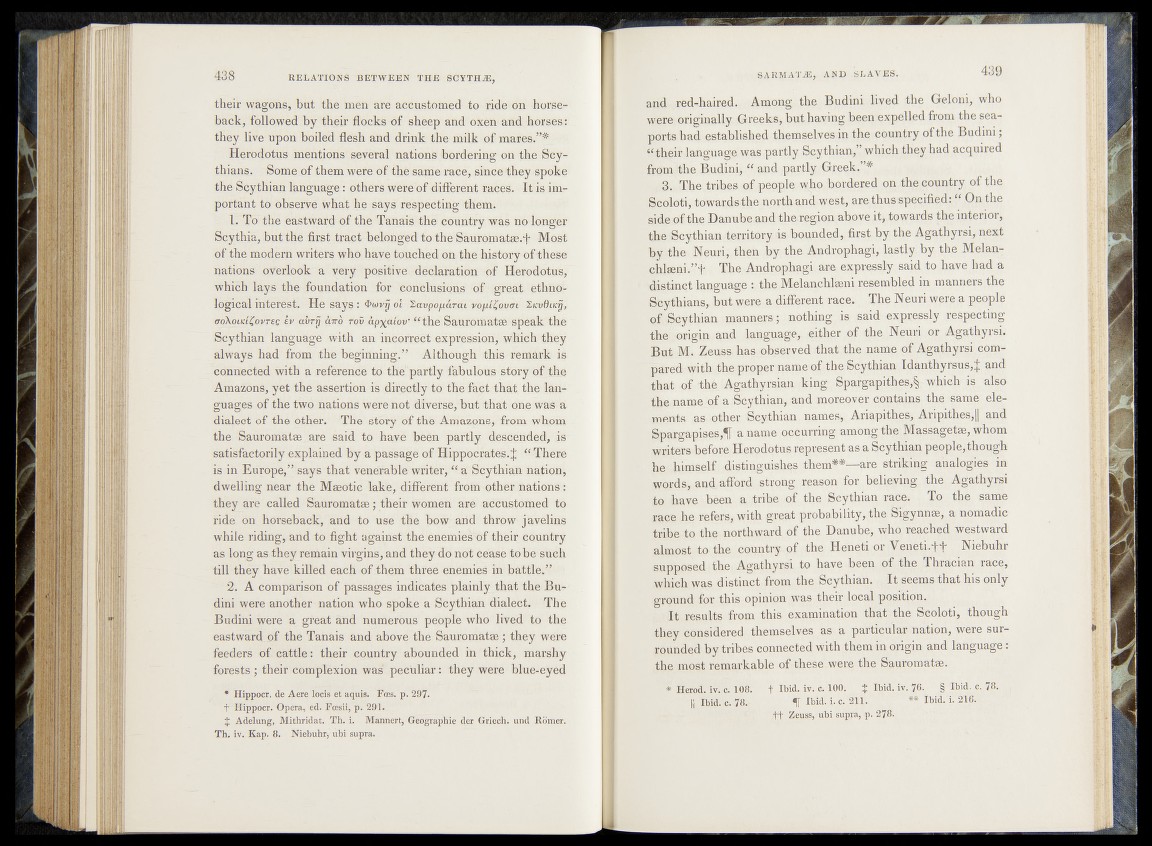
their wagons,,but the men are accustomed to ride On horseback,
followed by their flocks of sheep and oxen and horsesr
they live upon boiled flesh and drink the -bJÉk-Of mates.”^
Herodotus mentions several nations bordering on the Scythians:,
Some of them were of the same race, since^hey Spoke
the Scythian language: others were if different races. It is important
to observe what he says respecting them.
1. To the eastward of the Tanais the country was no longer
Scythia, but the first tract belonged to the'Sauromatse.t -Most
of the modern writers who have touched on the history ofthese
nations overlook a very positive declaration of Herodotus,
which lays the foundation for conclusions of great ethnological
interest. He Says • d>wvjjol Xavpofiajrat t>op.t£ovit v Emducrj,
<m\oiK(£ovrec kv a i r y a-rro tov a p y a lo v ’ “th e Saurottiata; speak the
Scythian language with an incorrect expression, which they
always had from the beginning.” Although this remark is
connected with a reference to the'partly fabulous Story ofth©
Amazons, yet the assertion is directly to the fact that the languages
of the two nations were not diverse,'but that- One WaJS»a
dialect of thé other. The story of thé Aihazpns, from w'hpin
th e Sauromatae are said to haye beön partly descended«/^
satisfactorily explained by a passage of Hippocrates. J “ There
is in Europe,” says that venerable w riter,^ a ^Scythian nation,
dwelling near the Maeotic lake, different from other nations:
they are called Sauromatse; their women are aecustofned to
ride on horseback, and to use the bow arid throw javelins
while riding, and to fight against the enemies'b'f their country
as long"as they remain virgins, and they do not cease to be such
till they have killed each of them three enemies in battle.”
2. A comparison of passages indicates plainly that the Bu-
dini were another nation who spoke a Scythian dialect. The
Budini were a, great and numerous people who lived to the
eastward of the Tanais and above the Bauromatse ; they were
feeders of. cattle: their country abounded in thick, marshy
forests ; their compléxion was* peculiar: they were blue-eyed
• Hippocr, de Aere locis ét aquis. Tees. p. 297.
; t Hippocr. Opera, ed. Fcesii, pv1l29i,’ 8
X Adelung, Mithridat. Th. i. Mannert, Geographic der Griech. trad Romer.
Th. iv. Kap. 8, Niebuhryubi supra.
and red-rhaired. Among the Budini lived the Geloni, who
were'originally. .Greeks, but having beenexpelled from the sea-
ports had-established themselvesin the country of the Budini;
“ theirTanguage-was partly Scythian/’ which they had acquired
from the Budini, “ and partly (Gfeek.’’* r ,,
. 3 . The tribes of people who,.,bprdered on th e country of the
iooloti, towardsthe^prth.andlwp? t, arethjisspecified: “ On the
side of the Danube,and tlre«.region aboveit, towards the interior,
the Scythian territory $is. bounded, first by the Agathyrsi, next
by th e Meuri,.then b y th e Androphagi, lastly by the Melan-
chlmni.”b The-Androphagi. are expressly said to .have had a
'distinct language :,the Melanfchlhni,resembl©d in manners .the
•Shythians, but were a different race. The Neuri were a people
of-Scythian manners; nothing-is said expressly irespectrng
the- qrigip and language,, either ,pf tbe^p|^U|i .9,*- Agathyrsi.
But M- Z e t b a s observed th a t the name of Agathyr®j,com-
■paredwith:the proper name of thefeythian Idanthyrsus;| and
th a t o f *thè Agat%rsi;aniking^pafgapithe|^"whieh i|, aiso
the name, of a Scythian, and njpr^pyer pmi^ns, the | B | [ elements
,as other -Scythian nam.es, Ariapithe^ Atjpffhes^l and
SpargapiseSj^f a namepccurripg* amongthe* Massagetm, whom
writers before Herodpfeusjegresent as a ^Cy thian people, though
he himselff .distinguishes thcm##r^ d e ^ n rk in g 'a n a lo g s in
words, Tea8o6^D % J ^ g i» g ; the Agathyrsi
t© have been a ^tribe of the Scythian Tacp. . To thé^ same
race he refers, with great p l i a b i l i t y j |h | ^ g y r ^ a nomadic
tribe to the}northward of ther Danube, f ho reached westward
almost,to the country.of; the H e n e ti|;V e im t|j||| Niebuhr
supposed the Agathyrsi to havedieftn o f the Thracian race,
whjch was distinct from tbe Scythian. :'^It skm s that his only
ground for this opinion was .theirlocal «position.
I t results from .this-examination that the Scoloti, though
they considered themselves ,|s* a particular nation, vveTe surrounded
by tribes connected, with them in origin and language :•
the most remarkable of-these .were the ...
* Herod, iv. c. 108. f l f Xbldliv. c. 100. X ^8' !
R Ibid. ^ 7 % 1 * **' ..
- '!É f Zeuss, ubi supra, p. 278.